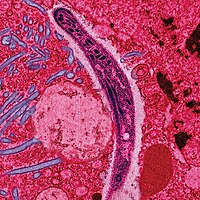
Photo from wikipedia
Abstract Abstract Trypanosoma cruzi, the aetiological agent of Chagas disease, exists as an anthropozoonosis in Louisiana. Raccoons are an important reservoir, as they demonstrate high prevalence and maintain high parasitaemia… Click to show full abstract
Abstract Abstract Trypanosoma cruzi, the aetiological agent of Chagas disease, exists as an anthropozoonosis in Louisiana. Raccoons are an important reservoir, as they demonstrate high prevalence and maintain high parasitaemia longer than other mammals. Given the complex nature of parasite transmission networks and importance of raccoons as reservoirs that move between sylvatic and domestic environments, detailing the genetic diversity of T. cruzi in raccoons is crucial to assess risk to human health. Using a next-generation sequencing approach targeting the mini-exon, parasite diversity was assessed in 2 metropolitan areas of Louisiana. Sequences were analysed along with those previously identified in other mammals and vectors to determine if any association exists between ecoregion and parasite diversity. Parasites were identified from discrete typing units (DTUs) TcI, TcII, TcIV, TcV and TcVI. DTUs TcII, TcV and TcVI are previously unreported in raccoons in the United States (US). TcI was the most abundant DTU, comprising nearly 80% of all sequences. All but 1 raccoon harboured multiple haplotypes, some demonstrating mixed infections of different DTUs. Furthermore, there is significant association between DTU distribution and level III ecoregion in Louisiana. Finally, while certain sequences were distributed across multiple tissues, others appeared to have tissue-specific tropism. Taken together, these findings indicate that ongoing surveillance of T. cruzi in the US should be undertaken across ecoregions to fully assess risk to human health. Given potential connections between parasite diversity and clinical outcomes, deep sequencing technologies are crucial and interventions targeting raccoons may prove useful in mitigating human health risk.
Journal Title: Parasitology
Year Published: 2023
Link to full text (if available)
Share on Social Media: Sign Up to like & get
recommendations!